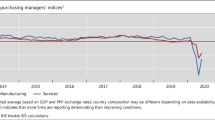Abstract
The Greek crisis has taken a heavy toll on incomes, employment and wealth. It took eight years, three adjustment programmes, one major debt restructuring and three rounds of bank recapitalization to resolve the crisis. Several factors can explain the length and depth of the Greek crisis: policy mistakes, delays, political resistance to the implementation of the required reforms and deficiencies in the Economic and Monetary Union (EMU) architecture. Despite all these, the implementation of a bold economic adjustment programme has eliminated macroeconomic imbalances, improved labour cost competitiveness and reformed various sectors of the Greek economy. The banking system has been restructured and recapitalized and its corporate governance improved. The economy is now recovering; its openness has improved and has started to rebalance towards the tradable, export-oriented sectors. Significant challenges and crisis-related legacies remain: high levels of public debt, nonperforming loans and unemployment. To address these challenges, emphasis must now be placed on implementing the reforms required to speed up the recovery and to accelerate the rebalancing of the economy towards a knowledge-based and export-led growth model. Bold steps should be taken towards the completion of the EMU, by promoting greater political solidarity and fostering risk-sharing.
Similar content being viewed by others
Notes
For example, according to Alesina et al. (2015a, b), revenue-based consolidations are more harmful for output dynamics than expenditure-based consolidations. The more benign effect of the latter type of consolidations works through their positive impact on business confidence and private investment. Moreover, Kasselaki and Tagkalakis (2016), using Greek data, have found that a government spending-based fiscal consolidation improves financial markets and boosts economic sentiment. This, in turn, mitigates the direct negative impact of fiscal consolidation on private investment and output, leading to a more rapid recovery.
R&D spending in 2017 rose to 1.14% of GDP from 0.67% of GDP in 2011, but still lags behind the euro area average of 2.13% in 2016. The ICT share in GDP in Greece was 3.1% in 2015 and lags behind the EU average of slightly above 4%. Indicatively, Ireland recorded an ICT sector share in GDP of 11.6% in 2014 (European Commission 2018a).
References
Abiad, A., Dell’ Ariccia, J., & Li, G.B (2011). Creditless recoveries, IMF working paper 11/58. https://www.imf.org/external/pubs/ft/wp/2011/wp1158.pdf
Acemoglu, D., & Robinson, J. (2012). Why nations fail: The origins of power, prosperity, and poverty. New York: Crown Business.
Alesina, A., Barbiero, O., Favero, C., Giavazzi, F., & Paradisi, M. (2015a). Austerity in 2009-13. Economic Policy, 30(83), 383–437.
Alesina, A., Favero, C., & Giavazzi, F. (2015b). The output effects of fiscal consolidation plans. Journal of International Economics, 96(Supplement1), 19–42.
Bank of Greece (2018). Monetary Policy, Interim Report, December. https://www.bankofgreece.gr/BogEkdoseis/Inter_NomPol2018.pdf.
Bank of Greece (2019), FinTech innovation hub. https://www.bankofgreece.gr/Pages/en/Bank/InnovationHub/FinTechHub.aspx
Beck, T., Dermirguc-Kunt, A., Laeven, L., & Levine, R. (2004). Finance, firm size, and growth. Journal of Money, Credit and Banking, 40(7), 1379–1405.
Berti, K., & Meyermans, E. (2017). Maximising the impact of labour and product market reforms in the euro area - sequencing and packaging. Quarterly Report on the Euro Area (QREA), Directorate General Economic and Financial Affairs (DG ECFIN), European Commission, 16(2), 7–19.
Bhagwati, J., & Hamada, K. (1974). The brain drain, international integration of markets for professionals and unemployment: A theoretical analysis. Journal of Development Economics, 1(1–2), 19–42.
Blanchard, O., & Leigh, D. (2013). Growth forecast errors and fiscal multipliers. American Economic Review Papers and Proceedings, 103(3), 117–120.
Blanchard, O., & Leigh, D. (2014). Learning about fiscal multipliers from growth forecast errors. IMF Economic Review, 62(2), 179–212.
Blanchard, O. J., & Summers, L. H. (1986). Hysteresis and the European unemployment problem. In S. Fischer (Ed.), NBER Macroeconomics Annual, Fall (pp. 15–78). Cambridge: MIT Press.
Dellas, H., Malliaropulos, D., Papageorgiou, D., & Vourvachaki, E. (2017). Fiscal policy with an informal sector, Bank of Greece Working Paper, No. 235, October. https://www.dept.aueb.gr/sites/default/files/econ/research-workshop/dmpv_2017_fiscal-policy-with-an-informal-sector-31.pdf.
European Commission (2018), Deepening Europe’s economic and monetary union, commission note ahead of the European council and the euro summit of 28-29 June 2018. https://ec.europa.eu/commission/sites/beta-political/files/euco-emu-booklet-june2018_en.pdf
European Commission (2018a), Digital Economy and Society Index Report 2018 The EU ICT sector and its R&D performance. https://ec.europa.eu/digital-single-market/en/research-development-scoreboard
European Commission (2019), 2019 European Semester, Country Report: Greece 2019 Including an In-Depth Review on the prevention and correction of macroeconomic imbalances, Brussels, https://ec.europa.eu/info/sites/info/files/file_import/2019-european-semester-country-report-greece_en.pdf
Kasselaki, M., & Tagkalakis, A. (2016). Fiscal policy and private investment in Greece. International Economics, 146, 53–106.
Katsimi, M., & Moutos, T. (2010). EMU and the Greek crisis: Are there lessons to be learnt? European Journal of Political Economy, 26(4), 568–576.
Kinoshita, Y. (2011), Sectoral composition of foreign direct investment and external vulnerability in Eastern Europe, IMF working paper 11/123. https://www.imf.org/en/Publications/WP/Issues/2016/12/31/Sectoral-Composition-of-Foreign-Direct-Investment-and-External-Vulnerability-in-Eastern-24886
Malliaropulos, D. (2019), The Greek economy in 2019 - outlook, risks and major challenges, presentation at the FitchRatings seminar, https://www.bankofgreece.gr/Pages/en/Bank/News/Speeches/Default.aspx?Item_ID=578&List_ID=b2e9402e-db05-4166-9f09-e1b26a1c6f1b
Möller, J. (1990). Unemployment and deterioration of human capital. Empirical Economics, 15, 199–215.
Olofsdotter, K. (1998). Foreign direct investment, country capabilities and economic growth. Review of World Economics, 134(3), 534–547.
Reisen, H., & Soto, M. (2001). Which types of capital inflows foster developing country growth? International Finance, 4(1), 1–14.
Stournaras, Y. (2018a), Investment opportunities in Greece −investment opportunities in Greece, speech at the “repositioning Greece” event of Ekali Club, 17 December. https://www.bankofgreece.gr/Pages/en/Bank/News/Speeches/DispItem.aspx?Item_ID=556&List_ID=b2e9402e-db05-4166-9f09-e1b26a1c6f1b
Stournaras, Y. (2018b), What lies in store for the eurozone? An assessment of the Greek bailout programmes: Has the EU become wiser?, speech at the Economist’s event: Southeast Europe–Germany business and investment summit: Reassessing Europe’s priorities, Berlin, 3 December. https://www.bankofgreece.gr/Pages/el/Bank/News/Speeches/DispItem.aspx?Item_ID=553&List_ID=b2e9402e-db05-4166-9f09-e1b26a1c6f1b
Stournaras, Y. (2019a), International economic developments and prospects of the Greek economy, Speech at an event of the Federation of Industries of Northern Greece, Thessaloniki, 15 March. https://www.bankofgreece.gr/Pages/el/Bank/News/Speeches/DispItem.aspx?Item_ID=582&List_ID=b2e9402e-db05-4166-9f09-e1b26a1c6f1b
Stournaras, Y. (2019b), Article published in the 100th edition of The Bulletin (OMFIF): Addressing reversal of financial integration. https://www.bankofgreece.gr/Pages/en/Bank/News/Speeches/DispItem.aspx?Item_ID=560&List_ID=b2e9402e-db05-4166-9f09-e1b26a1c6f1b
World Bank (2018), Doing business 2019: A year of record reforms, rising influence, 31 October. https://www.worldbank.org/en/news/immersive-story/2018/10/31/doing-business-2019-a-year-of-record-reforms-rising-influence
World Economic Forum (2018), The global competitiveness report 2018. http://reports.weforum.org/global-competitiveness-report-2018/?doing_wp_cron=1553010986.3554461002349853515625
Author information
Authors and Affiliations
Corresponding author
Additional information
Publisher’s Note
Springer Nature remains neutral with regard to jurisdictional claims in published maps and institutional affiliations.




